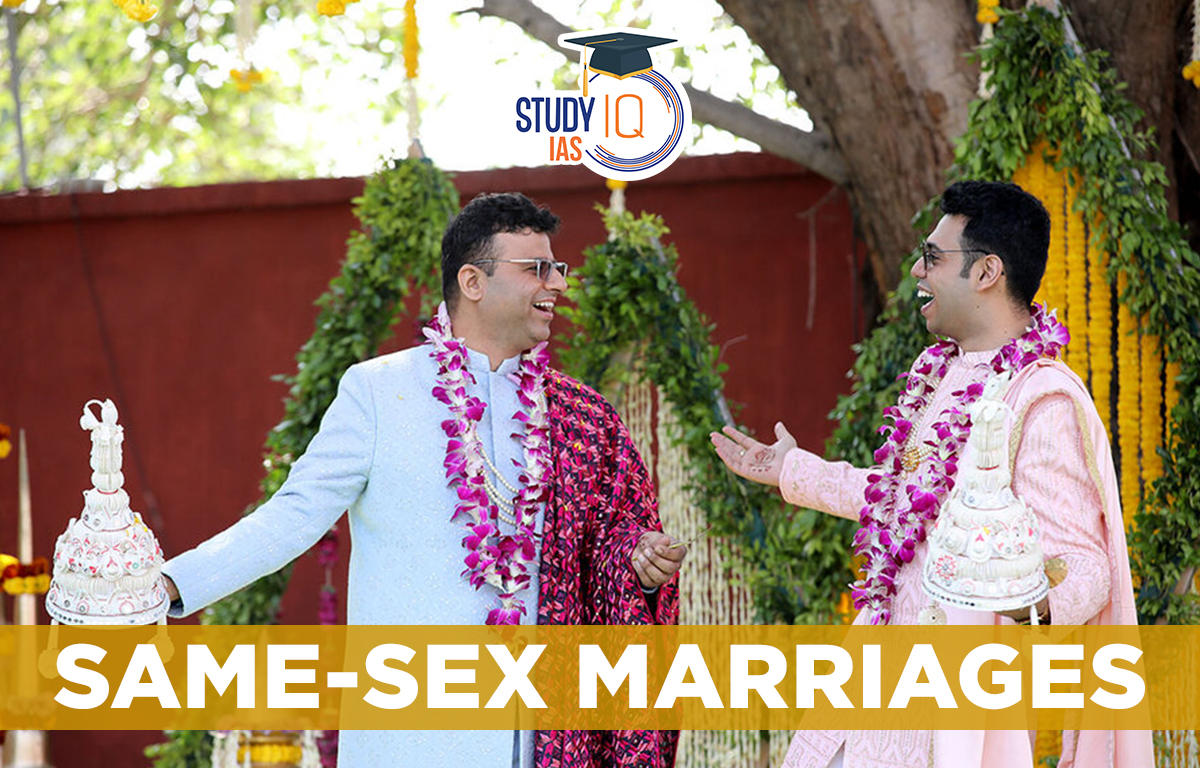Table of Contents
More on Same-Sex Marriages
- These petitions were filed before the Delhi and Kerala High Courts.
- This is the first big intervention in LGBTQ rights after the Supreme Court curtailed Section 377 of the Indian Penal Code in 2018.
- Section 377: Section 377 of the Indian Penal Code (IPC) is an act that criminalises homosexuality. It was introduced in the year 1861 during colonial rule.
- Under the law, an individual will be punished with imprisonment for life if they voluntarily have carnal intercourse against the order of nature with any man, woman or animal.
What was the Basis of the Petitions?
- Dignity for same-sex couples: Non-recognition of same-sex marriage is an act of discrimination that strikes at the root of dignity and self-fulfilment of LGBTQ+ couples.
- Equality for all: Equality is not achieved with the discrimination of homosexuality alone but must extend to all spheres of life, including the home, workplace and public places.
- Currently, rights of wages, gratuity, adoption, surrogacy, etc., are not available to LGBTQ+ citizens.
- Protect Fundamental Rights: Homosexuals have a fundamental right to live with dignity. They are entitled to be treated as human beings and should be allowed to imbibe the spirit of fraternity.
Supreme Court’s Decision on Same-sex Relationship
- Navtej Singh Johan Case: Supreme Court in Navtej Singh Johar case, 2018, decriminalized homosexuality.
- It held that criminalization of private consensual sexual conduct between adults of the same sex under Section 377 of the Indian Penal Code is clearly unconstitutional.
- Discrimination on the basis of sexual orientation is a violation of freedom of speech and expression.
- Parts of Section 377 relating to sex with minors, and non-consensual sexual acts such as rape, and bestiality remain in force.
Current Status of Same-sex Marriages in India
- Marriage laws: In India, the law currently says that marriage was permissible between a “biological man” and a “biological woman”.
- The institution of marriage between two individuals of the same gender is neither recognised nor accepted in any uncodified personal laws or any codified statutory laws.
Same-Sex Marriages in other Countries
- An LGBTQ advocacy group’s report says that only 32 countries around the world recognise same-sex marriage.
- In majority of countries that allow same-sex marriage, marriage equality was introduced by legislation. Such marriages by court rulings were recognised in only 10 countries.
United States:
- The Supreme Court of the US recognised same-sex marriages in a 5:4 ruling in 2015. It said that limiting marriage solely to heterosexual couples violated the 14th Amendment guarantee of equal protection under US law.
- Nation-wide legalization of same-sex marriages took place based on the decision. Before the ruling, 32 states had already recognised same-sex marriage.
Netherlands
- Netherlands was the first country in 2001 to legalize same-sex marriage by amending one line in its civil marriage law.
Australia
- Australia’s Parliament passed a law recognising same sex-marriage following a nationwide referendum (62% support) in 2017.
Ireland and Switzerland
- A formal recognition of LGBTQ marriages took place following a popular vote by the majority.
South Africa
- South Africa, in 2006, became the first African country to legalize same-sex marriages following a decision by the highest court in the land.
Taiwan
- Taiwan became the first Asian country to recognise same sex-marriage in 2019. The country’s parliament brought a legislation following a court ruling in 2017.
Argentina
- Argentina became the first Latin American country and the 10th country in the world to legalize same-sex marriages nationwide in 2010.
Canada
- Same-sex couples in Canada enjoy the legal benefits of marriage since 1999 when the federal and provincial governments extended marriages under the Common Law to LGBTQ couples.
- Same-sex marriages were made legal in nine of Canada’s 13 provinces and territories in 2003.
- Canada’s Parliament formally recognised same-sex marriages by passing a nationwide legislation to this effect.


 SSC CGL Apply Online 2024, Last Date is ...
SSC CGL Apply Online 2024, Last Date is ...
 SSC Stenographer 2024 Notification Out a...
SSC Stenographer 2024 Notification Out a...
 IB SA MTS Final Result 2024 Out at mha.g...
IB SA MTS Final Result 2024 Out at mha.g...

















